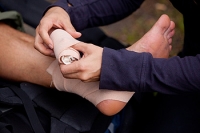When the ligaments that connect and support the ankle joint get stretched or torn during a physical activity or accident, an ankle sprain may occur. Ankle sprains are very common and are often recurrent because they sometimes go untreated, and therefore don’t heal properly. You may sprain your ankle while running or walking on uneven surfaces, making sudden movements or landing wrong after a jump during sports, or twisting your ankle wearing high heels. Ankle sprains are graded in severity from 1-3 with symptoms such as pain, bruising, swelling, instability, tenderness, and limitation of movement. If you believe you have sprained your ankle, contact a podiatrist who can properly diagnose you and use a variety of methods such as RICE (rest-ice-compression-elevation), bracing, physical therapy, medication and more to treat your ankle sprain and to help avoid chronic ankle instability.
Ankle pain can be caused by a number of problems and may be potentially serious. If you have ankle pain, consult with Dr. Kenneth Donovan from Advanced Care Foot and Ankle. Our doctor will assess your condition and provide you with quality foot and ankle treatment.
Ankle pain is any condition that causes pain in the ankle. Due to the fact that the ankle consists of tendons, muscles, bones, and ligaments, ankle pain can come from a number of different conditions.
Causes
The most common causes of ankle pain include:
- Types of arthritis (rheumatoid, osteoarthritis, and gout)
- Ankle sprains
- Broken ankles
- Achilles tendinitis
- Achilles tendon rupture
- Stress fractures
- Bursitis
- Tarsal tunnel syndrome
- Plantar fasciitis
Symptoms
Symptoms of ankle injury vary based upon the condition. Pain may include general pain and discomfort, swelling, aching, redness, bruising, burning or stabbing sensations, and/or loss of sensation.
Diagnosis
Due to the wide variety of potential causes of ankle pain, podiatrists will utilize a number of different methods to properly diagnose ankle pain. This can include asking for personal and family medical histories and of any recent injuries. Further diagnosis may include sensation tests, a physical examination, and potentially x-rays or other imaging tests.
Treatment
Just as the range of causes varies widely, so do treatments. Some more common treatments are rest, ice packs, keeping pressure off the foot, orthotics and braces, medication for inflammation and pain, and surgery.
If you have any questions, please feel free to contact one of our offices located in Warren, Livingston, and Toms River, NJ . We offer the newest diagnostic and treatment technologies for all your foot care needs.

